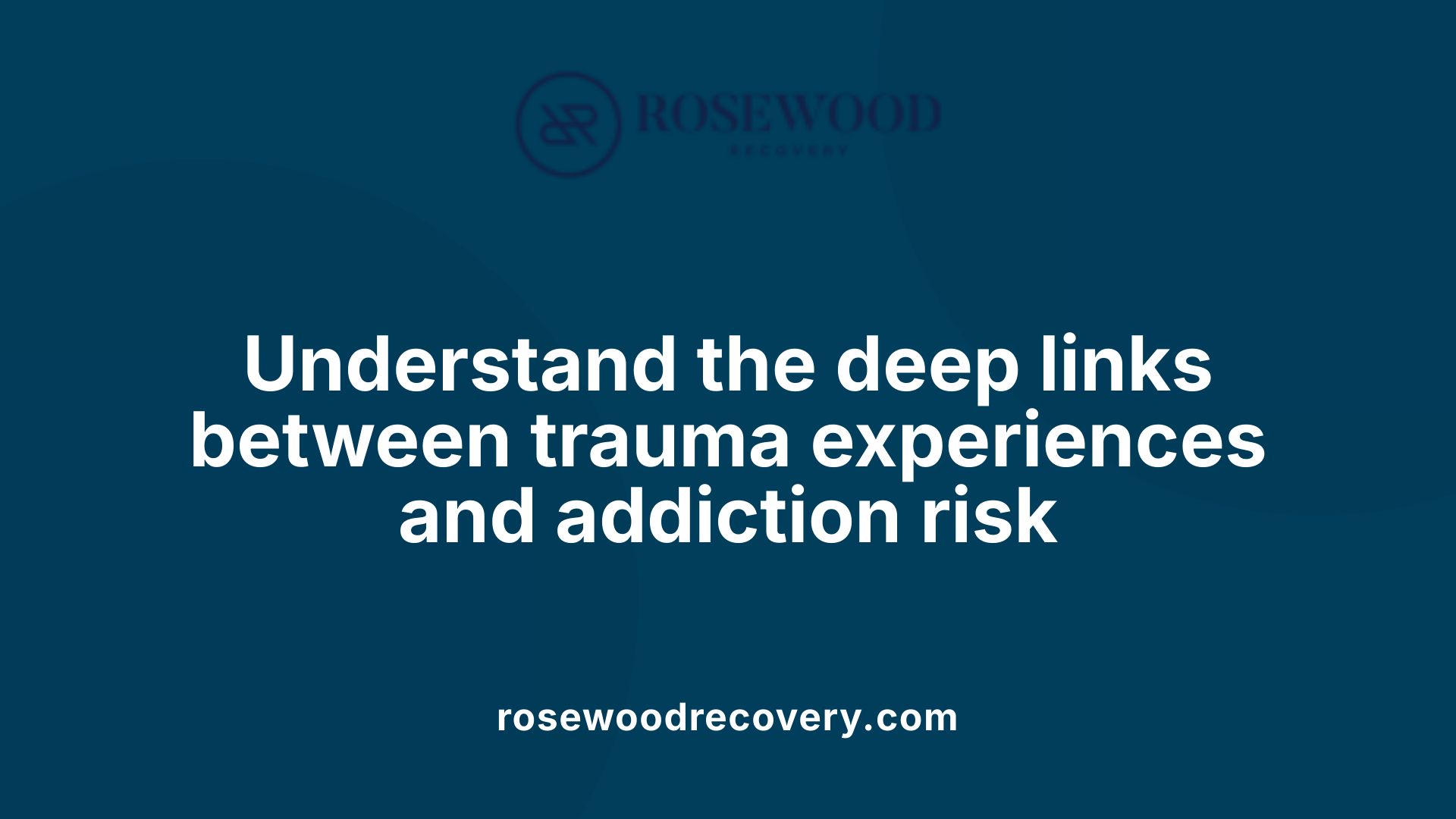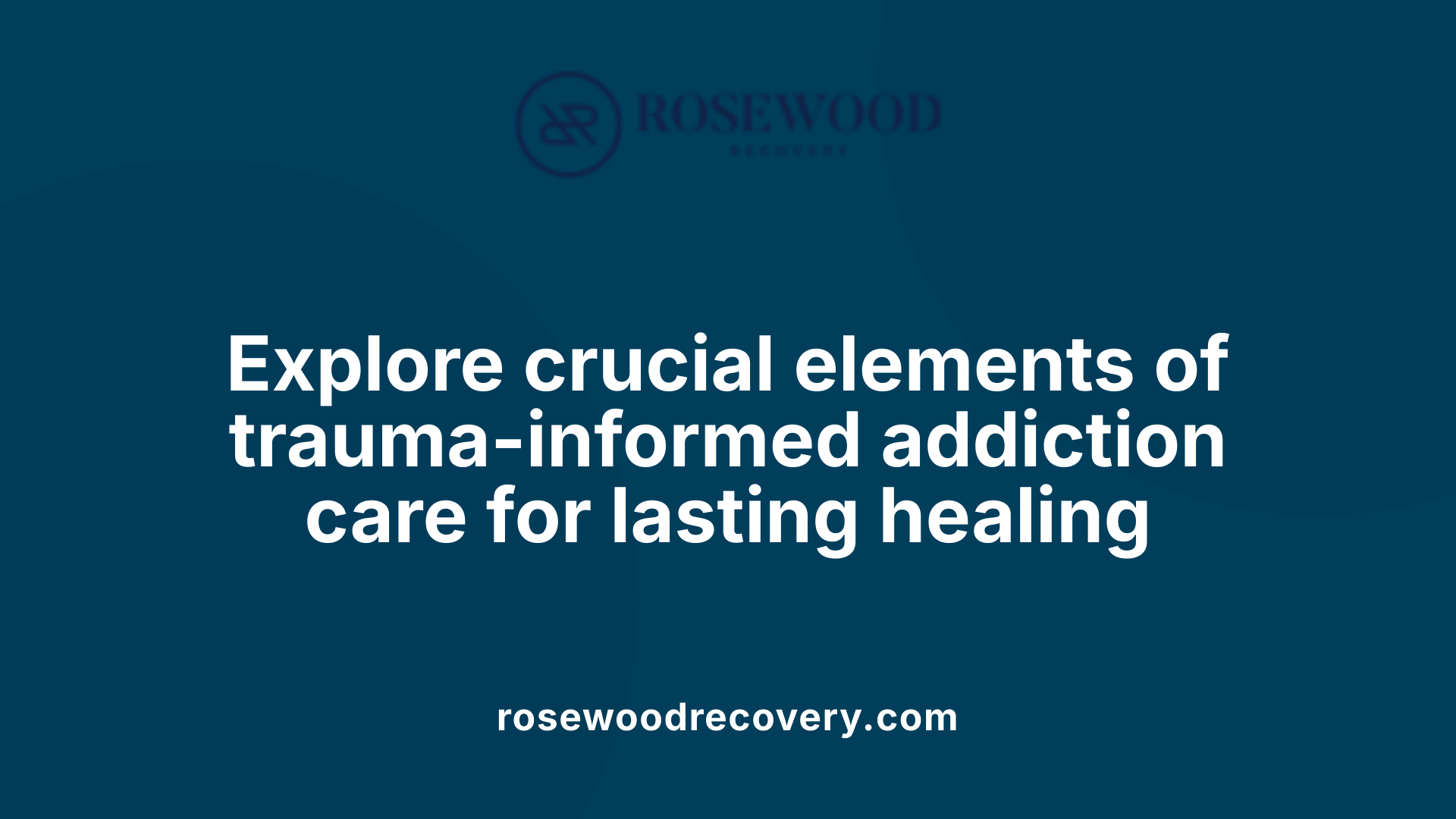Understanding the Hidden Link Between Trauma and Addiction Relapse
Emotional trauma often lies at the root of addiction, silently influencing relapse risk and complicating recovery efforts. This article explores how unhealed emotional trauma shapes the vulnerability to substance use disorders, the importance of integrated treatment approaches, and the role of personalized, trauma-informed care in sustaining long-term recovery.
The Complex Relationship Between Trauma and Addiction

Types of Trauma Affecting Addiction
Trauma encompasses a range of distressing experiences that can influence addiction vulnerability, including physical assaults, sexual abuse, domestic violence, emotional abuse, neglect, and exposure to violence or combat. Both major traumatic events ('Big T') and chronic stressors ('Little t'), such as ongoing family conflict or discrimination, contribute to heightened addiction risk. Childhood trauma is particularly impactful, raising the chances of developing substance use disorders and other health complications.
Neurobiological Impact of Trauma on Addiction Vulnerability
Trauma causes lasting changes in brain structure and chemistry that impair stress regulation and reward processing. Exposure to trauma disrupts neural circuits involving the prefrontal cortex, amygdala, hippocampus, and striatum, leading to increased sensitivity to stress and compromised impulse control. These neurobiological alterations affect motivation and pleasure sensations, making those affected more susceptible to substance misuse as a form of self-medication.
Emotional Trauma's Role in Substance Misuse
Emotional trauma, such as bullying or abuse, can induce mental health challenges that intensify the risk of turning to drugs or alcohol to cope with distress. The psychological scars left by unresolved trauma often lead to feelings of guilt, shame, and rumination, perpetuating substance use as a maladaptive coping mechanism. Chronic stress from trauma binds individuals to substances in a trauma bond addiction, where use temporarily relieves emotional pain but creates dependency.
Self-Medication and Trauma Bond Addiction
Many individuals with trauma-related mental health conditions, such as PTSD, resort to substances to alleviate symptoms like intrusive thoughts, anxiety, and emotional numbness. This self-medication cycle reinforces dependence and complicates recovery efforts. Addressing trauma alongside addiction through integrated treatments like cognitive-behavioral therapy (CBT), trauma-focused therapies, and medically supervised care is essential to breaking this cycle and enhancing long-term recovery.
What Types of Addiction and Mental Health Issues Can Comprehensive Treatment Services Address?
Comprehensive treatment services cater to a broad range of addiction and mental health challenges. They treat substance use disorders involving alcohol, opioids, nicotine, cannabis, stimulants, and also behavioral addictions like gambling and eating disorders. These programs address co-occurring mental health issues such as depression, anxiety, bipolar disorder, and PTSD through integrated care. Treatment strategies combine behavioral therapies, medication-assisted treatment, and tailored care levels from outpatient to inpatient settings, complemented by ongoing support and family interventions to foster holistic recovery.
Neurobiological Effects of Trauma That Elevate Relapse Risk

How Does Trauma Cause Brain Changes That Impact Addiction?
Trauma profoundly affects brain structure and function, particularly in areas tied to stress regulation, reward, motivation, and impulse control. Key regions such as the prefrontal cortex, amygdala, hippocampus, and striatum experience structural and functional alterations. Trauma releases toxic stress hormones like cortisol and norepinephrine, which damage neural pathways and disrupt normal cognition and emotion processing.
What Happens to Stress Response Systems in Trauma?
Trauma disrupts the body's adaptive stress response, which normally unfolds in three phases: baseline, acute reaction, and recovery. In people with chronic or early-life trauma, this system becomes maladaptive, leading to heightened sensitivity to stress and impaired coping. Such disruptions in subjective feelings, physiology, neural activity, cognition, and behavior increase cravings and relapse risk in substance use disorders.
How Are Reward and Motivation Pathways Altered by Trauma?
Neurobiological changes alter the brain's reward circuits, making it harder to derive pleasure from everyday activities. This diminished reward sensitivity encourages self-medication with substances, which temporarily restore feelings of pleasure but perpetuate dependency. Early trauma alters motivation and impulse control, increasing vulnerability to addiction.
In What Ways Do Neural Circuits Influence Relapse Susceptibility?
During heavy drug use and withdrawal, especially in limbic and prefrontal brain areas, neural circuits regulating craving and emotional control become dysregulated. This results in heightened distress and dysfunctional stress processing, which fuel relapse. Recognizing these patterns has led to exploring targeted pharmacological and behavioral treatments that focus on stress pathophysiology to reduce relapse risk.
What Role Do Counseling and Therapy Play in Comprehensive Addiction Treatment?
Therapeutic interventions, such as cognitive-behavioral therapy (CBT) and trauma-informed care, help individuals understand the neurobiological and emotional roots of their substance use. Therapy teaches coping and stress management skills, addresses underlying trauma, and reduces relapse risk by promoting emotional health and resilience. Integrated treatment of trauma and addiction is essential for long-term recovery success.
Integrated and Personalized Treatment: Addressing Trauma and Addiction Together

How do integrated treatment programs benefit individuals with co-occurring substance abuse and mental health disorders?
Integrated treatment programs offer coordinated care that tackles both substance use disorders and trauma-related mental health conditions simultaneously. This approach provides a comprehensive healing experience by addressing the unhealed emotional wounds underlying addiction. Such programs reduce relapse rates and minimize emergency interventions and hospitalizations. Early identification of trauma and co-occurring disorders through systematic screening enables personalized trauma-informed plans that better meet individual needs.
Incorporating evidence-based therapies like cognitive-behavioral therapy (CBT) and motivational interviewing alongside family involvement and culturally competent care strengthens recovery outcomes. Integrated treatment fosters long-term stability, improving quality of life by overcoming fragmented care and provider training gaps.
Why is personalized treatment important in substance abuse and mental health recovery?
Personalized treatment tailors care to an individual's unique history, trauma exposure, mental health status, and life circumstances. This customization enhances engagement and motivation by making interventions more relevant and meaningful. Addressing co-occurring issues such as PTSD, depression, or anxiety alongside addiction ensures that all contributing factors are managed effectively.
Adaptive treatment plans evolve with a person's progress, helping them manage triggers and reduce relapse risk. Cultural sensitivity and respect for personal preferences improve trust and treatment adherence. Overall, a personalized, holistic approach increases the likelihood of sustained recovery and empowers individuals toward healthier, more resilient lives.
Trauma-Informed Care in Addiction Treatment
Trauma-informed care recognizes how trauma affects brain function, stress responses, and addiction risk. It prioritizes safety, trust, and empowerment in treatment settings. This approach includes therapies such as Trauma-Focused CBT and Eye Movement Desensitization and Reprocessing (EMDR) to help process traumatic memories and emotions.
By addressing trauma's deep impacts within addiction treatment, relapse risk decreases and emotional well-being improves. Trauma-informed care bridges mental health and substance use treatment, creating a supportive environment essential for recovery.
Dual Diagnosis Approaches
Dual diagnosis models treat mental health disorders and substance use disorders together rather than separately. This integration acknowledges the complex interplay between trauma, mental illness, and addiction.
Combined therapies and medical support enhance outcomes, while comprehensive aftercare and support networks help maintain recovery. Patients with co-occurring PTSD and substance abuse particularly benefit from these approaches, as untreated trauma often fuels continued substance use.
| Aspect | Description | Benefit |
|---|---|---|
| Integrated Programs | Coordinated treatment for both mental health and substance use disorders | Lower relapse, reduced hospitalization, improved outcomes |
| Personalized Treatment | Tailoring therapy to individual's history, culture, and needs | Higher engagement, motivation, and sustained recovery |
| Trauma-Informed Care | Attention to trauma's effects on brain and behavior, creating a safe treatment environment | Reduced relapse risk and emotional distress |
| Dual Diagnosis Approach | Simultaneous treatment of mental illness and addiction | Better management of complex co-occurring conditions |
This comprehensive and adaptive model represents a crucial advancement in addiction recovery, focusing on healing trauma while breaking the cycle of substance dependence.
Essential Components of Comprehensive Trauma-Informed Addiction Treatment

What components are typically included in comprehensive treatment services for addiction and mental health?
Comprehensive trauma-informed addiction treatment involves multiple coordinated components aimed at addressing both substance use disorders and co-occurring trauma-related mental health conditions. A foundational element is medical detoxification and inpatient care, which provides safe, supervised withdrawal and early stabilization from substances. This initial stage reduces physical discomfort and complications, setting the stage for effective ongoing treatment.
Evidence-based therapies play a critical role, including Cognitive Behavioral Therapy (CBT), Eye Movement Desensitization and Reprocessing (EMDR), and trauma-focused therapy. These therapies teach coping skills, help process traumatic memories, and reduce relapse risk by addressing underlying emotional and psychological issues.
Additionally, medication-assisted treatment (MAT), such as buprenorphine or methadone for opioid use disorder, supports recovery by reducing cravings and withdrawal symptoms, supporting sustained abstinence.
Holistic support that involves social and family engagement enhances the healing process. Incorporating family involvement, housing assistance, vocational training, spirituality, and community participation improves overall wellness and resilience.
Finally, comprehensive care includes aftercare and community support, which are vital for long-term recovery. Continued therapy, support groups, and linkage to community resources help individuals maintain gains and prevent relapse.
Together, these components form a person-centered, culturally sensitive, and trauma-informed approach that addresses the whole person, rather than isolated symptoms, thereby improving outcomes for individuals with trauma and addiction.
Aftercare and Long-Term Support: Safeguarding Recovery From Relapse

How does aftercare contribute to sustained recovery from addiction and mental health issues?
Aftercare is crucial in maintaining recovery by offering continuous support that addresses both addiction and trauma-related mental health challenges. It provides ongoing therapy sessions that help individuals solidify coping strategies learned during initial treatment, enabling better stress management and reducing the likelihood of relapse.
Ongoing therapy and coping skill development
Regular counseling, including cognitive-behavioral therapy (CBT) and trauma-informed therapies, empowers individuals to process unresolved trauma and develop healthy responses to triggers. This continual skill-building supports emotional regulation and resilience necessary for long-term recovery.
Community support groups and sober living
Participation in community-based groups and sober living environments fosters social support and accountability. These settings promote connection with peers who understand the struggles of recovery, offering encouragement and shared experiences that combat isolation and promote healing.
Family and peer involvement
Involving family members and peers creates a robust support system that reinforces positive behaviors and provides emotional stability. Family education about trauma and addiction increases understanding and helps in creating a supportive home environment conducive to recovery.
Monitoring and personalized treatment adjustments
Continuous monitoring through follow-up appointments enables early detection of relapse warning signs. Tailored adjustments to treatment plans ensure that evolving needs and challenges are addressed promptly, improving outcomes and maintaining recovery momentum.
Healing Trauma: A Critical Step in Preventing Addiction Relapse
Unhealed emotional trauma profoundly impacts relapse risk in substance use disorder by altering brain function, exacerbating stress responses, and perpetuating cycles of self-medication. Effective recovery requires integrating trauma-informed care with addiction treatment through personalized, comprehensive, and sustained approaches. Addressing the root causes of trauma alongside substance use disorders through evidence-based therapies, medical support, and aftercare not only reduces relapse risk but also fosters emotional resilience and long-term well-being. Promoting awareness of this critical connection empowers individuals and healthcare providers to prioritize healing trauma as an essential element of successful addiction recovery.
References
- Trauma and Stress | National Institute on Drug Abuse (NIDA)
- The Impact of Trauma on Addiction and Recovery
- Stress and substance use disorders: risk, relapse, and ...
- The long-term impact of post traumatic stress disorder on ...
- The Link Between Unresolved Trauma and Addiction
- How are Trauma and Addiction Connected?
- How Trauma Affects Substance Use Disorder (SUD)




